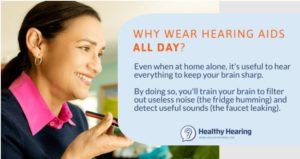Another great article in Healthy Hearing by contributor Temma Ehrenfeld on the need to wear hearing aids all the time.
 Temma shared the following: This spring, when I fell ill with COVID-19, I didn’t leave my apartment for six weeks. Neighbors and friends brought me medicine and food and I mostly kept in touch by texting. I spoke to my doctors by phone or video. I didn’t put on my hearing aids while alone or for these calls. I used headphones and turned up the volume. After all, with headphones you can just turn up the volume.
Temma shared the following: This spring, when I fell ill with COVID-19, I didn’t leave my apartment for six weeks. Neighbors and friends brought me medicine and food and I mostly kept in touch by texting. I spoke to my doctors by phone or video. I didn’t put on my hearing aids while alone or for these calls. I used headphones and turned up the volume. After all, with headphones you can just turn up the volume.
We’ve all heard the jokes about attending video meetings without your pants (or underwear??) and skipping a shower or two. Even if you weren’t sick, how many of us have left our hearing aids in the case?
But, as I soon learned, it’s important to wear hearing aids through your waking hours—even when you’re at home for days during a pandemic. To keep your hearing and brain sharp, the only time you should be removing your hearing aids is for sleeping and activities like showering or swimming.
You can put yourself back in ‘hearing-loss land’
When I did put my aids on again, for dinner at a table on the street, everything sounded way too loud—much like when I first got my hearing aids 20 years ago and it was excruciating to wear them on the streets of New York. Apparently six weeks was long enough to affect how my brain processes sound.
When we first get hearing aids, we need time to adjust. To acclimate during the adjustment period, hearing professionals usually recommend a person wear their aids a few hours each day, working up to full-day wear. This isn’t easy: At first people describe sounds as too loud. We hear too much background sound and some sounds seem sharp and unpleasant—usually high frequencies we used to miss. Most people adjust in two to three weeks, as our brains adapt to the new sounds and block out sounds like humming refrigerators.
When you take out your hearing aids for prolonged periods, you may feel that it’s harder to hear than it used to be. The difference is the amount of energy your brain puts into hearing. You’ve adapted to a hearing-aid world and your brain doesn’t work as hard at compensating for your hearing loss as it used to.
If you leave the aids off for any length of time during the day—as I did during my prolonged quarantine—your brain will adjust to the new conditions and you’ll either use more effort to hear or withdraw from communication. Some sounds will disappear.
How many hours a day should you wear hearing aids?
I’ll confess once I began working at home years ago, I’ve rarely worn my aids from the minute I got out of bed until the minute I fell asleep. So I asked Dr. Palmer: Is there a minimum number of hours of usage that would keep our brains primed?
Although there isn’t data to answer that question, she told me, audiologists see that people who wear their aids all through their waking hours do better. “The brain isn’t good at trying to listen in two ways—through the hearing loss and through the amplification system. The ear is a doorway to the brain, it doesn’t make sense to have it partially closed part of the day,” she explained.
My own observation is that part-time use has a big cost. I have a friend with profound hearing loss, much worse than mine. When neither of us wears our hearing aids, the difference is dramatic. But we’ve both noticed with surprise that when we are in a noisy restaurant wearing our hearing aids, he can hear better than I can. I thought the aids were the problem. However, now I have a different theory—he’d been wearing his aids whenever he was awake and was getting the full benefit of them. His brain was adapted to a fuller range of sound.
Read the full article by CLICKING HERE
We are here to help if you or a family member is having any difficulties with hearing, hearing aids, hearing aid apps or Tinnitus please give us a call at 727-323-2471 and set up an appointment.
We can help you.
Susan E. Terry, Au.D., F-AAA, F-NAP
Doctor of Audiology
Board Certified
P.S. We are here to help if you have any questions about your hearing, feel free to give us a call at 727-323-2471